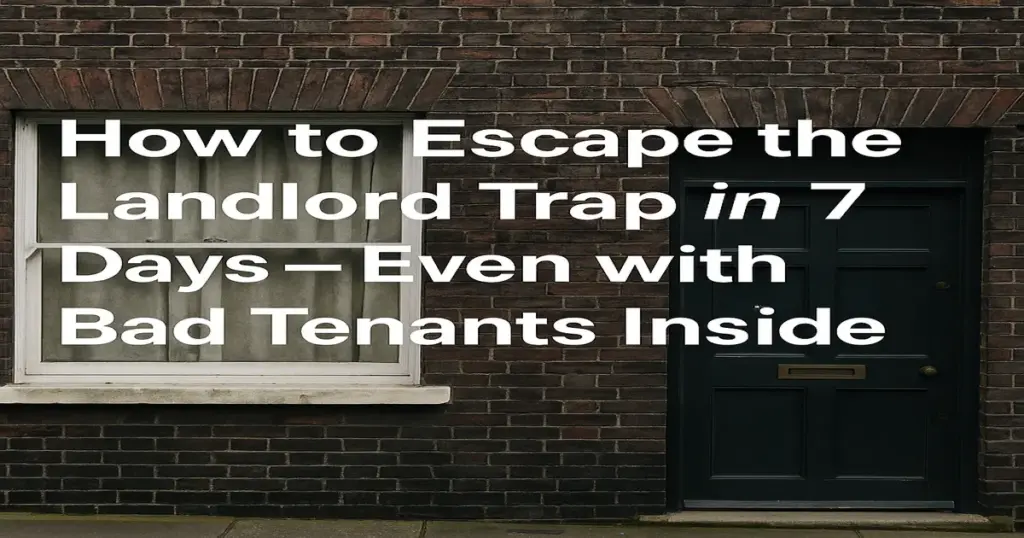How to Escape the Landlord Trap in 7 Days – Even with Bad Tenants Inside (UK Edition)
Being a landlord in the UK isn’t what it used to be. Once a dream of passive income and capital growth, property ownership has, for many, turned into a legal, emotional, and financial minefield.
Increased regulations, tax changes, economic volatility, and most critically, problematic tenants have stuck thousands of landlords in a trap that drains their time, money, and peace of mind.
If you’re one of them, this article is for you. It will guide you through legally and practically escaping the landlord trap in just 7 days — even if bad tenants occupy your property. We’ll explore your options, how to act fast, and how to do it without violating your obligations or falling foul of the law.
Understanding the Landlord Trap
Before we talk solutions, let’s define the problem.
The “landlord trap” is when you:
Own a property you no longer want to manage.
Have difficult tenants who don’t pay rent, damage property, or won’t leave.
Feel unable to sell because the tenants are still in situ.
Face legal constraints on eviction due to tenant protections.
Are overwhelmed by regulations, taxation, or personal burnout.
Once you’re in this position, it can feel impossible to escape — but it isn’t. You need the right strategies, and you need them fast.
The 7-Day Escape Plan – Overview
Here’s a quick summary of how you can legally and practically escape the landlord trap in one week:
Day 1: Establish Legal and Financial Position
Day 2: Engage with Professional Help
Day 3: Identify Your Exit Strategy
Day 4: List or Assign the Property for Sale
Day 5: Notify Tenants Legally (if needed)
Day 6: Negotiate or Incentivise Early Exit
Day 7: Complete the Transaction or Assign the Agreement
Let’s unpack these steps one by one.
Day 1: Establish Legal and Financial Position
The first step is to understand where you stand, legally and financially.
Legal Position
Is the tenancy agreement in writing? If so, is it an Assured Shorthold Tenancy (AST)?
Has the deposit been appropriately protected?
Are you current with EPC, gas safety, EICR, and Right to Rent checks?
Have you issued all the legally required documentation (e.g. How to Rent guide)?
Financial Position
Is the property mortgaged?
Are you in arrears on any payments?
What is the outstanding balance, and what’s the current market value?
Are tenants in rent arrears? By how much?
Why this matters: Knowing the facts allows you to choose the correct strategy and act within the law. If you try to sell or evict without compliance, you could delay your exit by months or face legal penalties.
Day 2: Engage with Professional Help
If you’re serious about exiting quickly, you need help.
Who to Contact
A solicitor or eviction specialist: They’ll ensure legal compliance.
An estate agent familiar with tenanted properties: Vital if you want to sell with tenants in place.
A property buying company: Especially one that buys tenanted homes — they can complete in days.
A landlord exit consultant: These specialists help landlords exit tricky situations with bad tenants and legal roadblocks.
Be wary of DIY approaches. Time is critical, and one misstep (like issuing the wrong eviction notice) can delay your escape for months.
Day 3: Identify Your Exit Strategy
Now choose your route. You usually have three main options:
Sell with Tenants in Situ
You can sell your property to another landlord who is happy to take it on with the existing tenants. This is the fastest and easiest route, especially if you:
Can’t evict.
Have long-term tenants.
Have bad tenants but don’t want to wait out legal action.
You might not get top market value, but you get speed, certainty, and peace of mind.
Serve Notice and Sell Vacant
This involves:
Issuing a Section 21 notice (if valid).
Waiting out the 2-month notice period.
Going to court if they don’t leave.
Selling after possession.
This route can take 2 to 6 months and is unsuitable if you want out fast.
Assign the Tenancy or Sell the Company
If your rental is in a limited company, you can sell the company rather than the property. This can be quicker and may offer tax benefits.
Bottom line: For a 7-day exit, you need to find a buyer willing to take the property with tenants in place.
Day 4: List or Assign the Property for Sale
With your strategy decided, move fast.
How to Sell in 7 Days
Contact property buying companies that specialise in tenanted properties. Many can complete within a week.
Choose cash buyers only. Mortgage buyers need time and vacant possession.
Use a specialist agent with access to investor databases.
Pricing for Speed
You may need to accept 80–90% of the full market value for a rapid sale. Remember: it’s a trade-off between price and speed. For many trapped landlords, escaping the stress is worth it.
Day 5: Notify Tenants Legally (If Needed)
You must serve proper notice if you decide not to sell with tenants in situ. But even if you do deal with tenants, it’s often smart to keep them informed.
Communication Tips
Be transparent but calm.
Don’t threaten or pressure.
Let them know the plan and their rights.
Legal Notices
Section 21: No-fault eviction; 2 months’ notice (must meet strict conditions).
Section 8: For serious rent arrears or antisocial behaviour, it can be faster but riskier to go to court.
Important: Never attempt to evict a tenant yourself. That’s illegal. Always go through the proper channels.
Day 6: Negotiate or Incentivise Early Exit
Many landlords succeed with cash-for-keys deals even if your tenant has a right to stay.
What is Cash for Keys?
You offer your tenant a sum of money to leave voluntarily. This is entirely legal if done respectfully and documented.
Typical offers range from:
£500–£2,000 depending on the location and situation.
Possibly more if arrears are large or damage is significant.
Why it works: Many tenants would rather take money and move than face court or a CCJ.
Day 7: Complete the Transaction or Assignment
With a buyer ready and legal ducks in a row, you can complete within a week — yes, even with tenants inside.
What to Expect
Your solicitor coordinates the transaction.
The buyer takes over the tenancy obligations.
You walk away free of stress, property, and legal entanglements.
Tip: Use express conveyancing services where possible — many property buying firms have in-house legal teams to speed things up.
Common Mistakes to Avoid
Serving invalid eviction notices.
Failing to protect the deposit adequately.
Trying to harass or threaten tenants into leaving.
Overvaluing your property — and wasting time.
Waiting too long, hoping things will improve.
Time is your enemy if you feel trapped. The longer you delay, the more financial and emotional damage you cause.
FAQs: Escaping the Landlord Trap
Can I sell my property with bad tenants inside?
Yes. You can sell to another landlord or a property investor happy to take over a tenanted property, even with rent arrears or antisocial behaviour. These buyers often specialise in distressed or problematic properties.
Is it legal to offer tenants money to leave?
Absolutely. It’s called a “cash for keys” arrangement. Ensure it’s done professionally and in writing, without threats or coercion.
Can I exit in 7 days?
Yes—if you choose the right buyer. Cash-buying firms can complete the process within a day, especially if they are used for tenanted properties. Traditional sales routes will take longer.
What if I didn’t register the tenant’s deposit?
You may be limited in using Section 21, and tenants may have a claim against you. However, you can still sell the property with the tenant inside or negotiate an exit.
Do I need to evict before I sell?
Not necessarily. Many landlords successfully sell with tenants in place — even troublesome ones. The buyer takes on the existing tenancy agreement.
Will I get market value?
It’s probably not the full market value if you want a 7-day sale. Expect a slight discount, but weigh that against months of legal costs, rent arrears, and stress.
What happens to the tenant after I sell?
They remain in place under the same tenancy agreement. The new owner becomes their landlord and must follow all the same legal obligations.
Can I change the locks if the tenant isn’t paying?
No. That’s illegal and could lead to criminal charges. Only the court can issue an eviction warrant, and bailiffs carry it out.
What if I have multiple properties in this situation?
You can sell them as a portfolio to an investor. Many buyers prefer multiple units, especially if they are mainly.
What if the tenant is destroying my property?
You may be able to serve a Section 8 notice on the grounds of damage., but sellingt, but selling touyer may be your best option for fast action.
Final Thoughts: Don’t Let the Trap Close In
Being a landlord in today’s UK property market is not for the faint-hearted. With so many legislative, financial, and interpersonal hurdles, even good landlords are losing their jobs.
But you don’t have to be stuck. You don’t have to wait for court hearings, battle tenants, or lose sleep.
With the right plan and the right buyer, you can escape the landlord trap in just seven days—even if bad tenants are still inside.
The key is action. Fast, informed, and legally sound action.
So take the first step today — assess your situation, get help, and start your exit.
Useful Links
Gov.uk – Private Renting: Evicting Tenants
https://www.gov.uk/evicting-tenants
Official government page explaining the process for serving Section 21 and Section 8 notices, plus court procedures.Shelter England – Tenancy Rights and Eviction
https://england.shelter.org.uk/housing_advice/eviction
Useful to understand the rights of tenants and the legal limits of landlord actions.Citizens Advice – Eviction and Rent Arrears
https://www.citizensadvice.org.uk/housing/renting-a-home/eviction
Provides balanced guidance on eviction rules and when landlords can legally act.
Read our top Blogs:
Sell My Property Fast For Cash In Wandsworth
What to Do If Your House Won’t Sell: Fast Solutions That Work
How to Sell House Fast: Proven Tips to Get a Quick Sale Without Estate Agents






